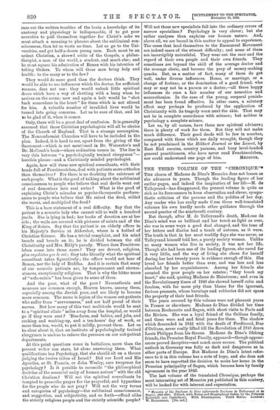THE THIRD VOLUME OF THE " CHRONIQUE." , THE charm of
Madame de Dino's Memoirs does not lessen as she advances in years. Though the leading figure of her earlier pages, and indeed the inspiration of her life—M. de Talleyrand—has disappeared, the present volume is quite as rich as its forerunners in keen observation and clever, sympa- thetic criticism of the persons and the politics of her day. Any reader who has really made ti-ese three well-translated volumes his own hardly needs other guidance through the second quarter of the nineteenth century.
But though, after M. de Talleyrand's death, Madame de Dino's mind was as brilliant and her touch as light as ever, she was in some ways a good deal changed, and the tone of her letters and diaries had a touch of autumn, as it were. The truth is that in her most worldly days she was never, as Talleyrand himself told her, a purely society woman. Unlike so many women who live in society, it was not her life. Though she had been one of its leading figures, she cared for it very little, and the way of living she chose for herself during her last twenty years is evidence enough of this. She loved her friends better than ever, and was less and less absorbed by her acquaintances. Among her friends she counted the poor people on her estates ; "they touch my heart," she said, quoting Madame de Maintenon ; and even in the Revolutionary times of 1848 she showed herself calm and fearless, with far more pity than blame for the ignorant, furious peasants, whose burnings and robberies did not spare the property of their best friends.
The years covered by this volume were not pleasant years in France or elsewhere. Madame de Dino divided her time between Rochecotte and Sagan, with short visits to Paris and the Riviera. She was a loyal friend of the Orleans family, and these were sad and fatal years for them. The shadow which descended in 1842 with the death of Ferdinand, Duo d'Orleans, never really lifted till the Revolution of 1848 drove Louis Philippe from his throne. Madame de Dino's lifelong friends, the Prussian Royal Family, appeared—though appear- ances proved deceptive—not much more secure. The political outlook in Germany was fully as dark and dangerous u in other parts of Europe. But Madame de Dino's latest refer- ence to it in this volume has a note of hope, and she does not seem to have regretted the decision to make her home in the Prussian principality of Sagan, which became hers by family agreement in the year 1843.
The last volume of the translated Chronique, perhaps the most interesting set of Memoirs yet published in this century, will be looked for with interest and expectation.
* Memoirs of the Duchess. de Dino (afterwards Duchesse de Talisprand et do Sagan), 1841-1850. Edited, with Notes and Biographical Index, by the Princess Radziwill (nee Castellano). With Frontispiece. Third Series. London: W. Heinemann. [10s. net.?:


































































 Previous page
Previous page